Astro Chef challenges you to repair the family legacy by serving weird food to weirdos
Smash, blend, hammer, cut and blast your way to a five-star restaurant in Astro Chef.
We’re at a point now where there’s a couple of dozen games launching on VR every week. While a lot of those might be smaller experiences, and a lot seem to be free, that does mean that there needs to be an increase in either quality or depth for games to survive in that space. Astro Chef is another simulation title, however it does a few things differently than its genre-mates and for the most part they’re improvements.
For a start, it’s set in space; specifically (in case you hadn’t gathered already) it’s about cooking in space. You’ve taken over your uncle’s space diner and are completely unproven. In the time since your uncle disappeared (died/went missing) his restaurant’s star rating has dropped from five star down to, well, zero. The goal then, is simply to serve your customers and serve them well. Then, resulting in that you have to score a great ranking from a food critic. The plot has, as it turns out, very little to do with the setting.
This is especially surprising because the customers, the dishes, the ingredients and the tools that you use are all incredibly in-universe. The foods are quirky, twisted versions of real-world — bizarre avocado and bananas are the first two you’ll use — the dishes they make are equally alien looking, and the customers… You get it. The developers have done a great job realising and creating an alien setting, and that comes through in almost every part of Astro Chef, there are even lore-dumps available for you to peruse, but we’ll get onto those later.
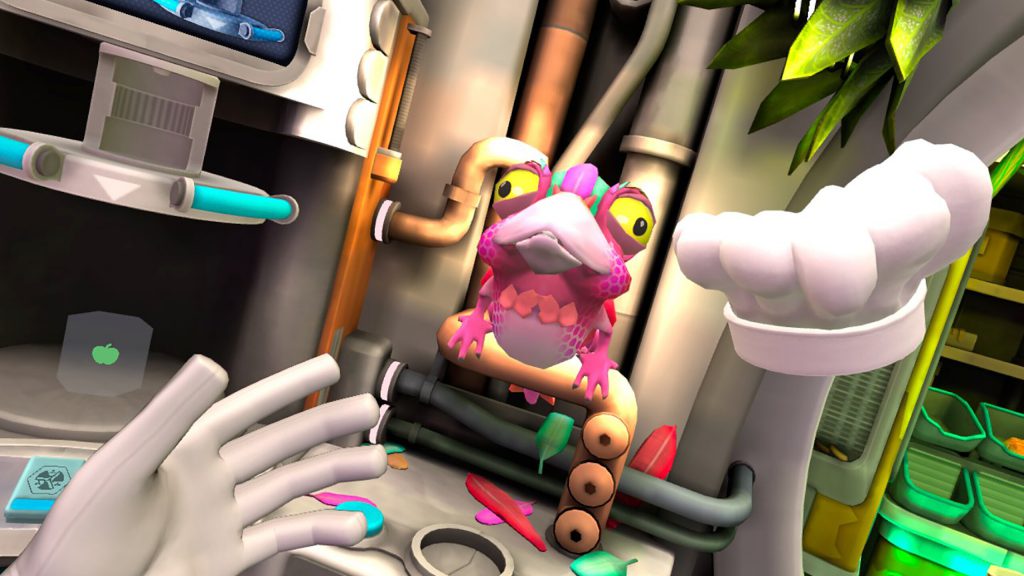
Space isn’t exactly the most novel or unique setting, especially not when it comes to simulation games on VR. However, it is done really well here. As I said, it’s more than skin-deep too, with a lot of care clearly put into the iconography that has gone into the food categories and language on areas like the vending machine (the vending machine is great). The swathes of text and information that are available when you scan things shows that a lot of thought has gone into the design, and it really starts to shine once you’ve fought your way through the bumpy onboarding.
VR has, as I see it, two major recurring problems. Well, it has four, but it won’t be the games that fix the fact we look goofy when we play it and that we can’t quickly blink between opaque and transparent mode. The two problems are really prevalent in games, and Astro Chef suffers from both of them. Firstly, it’s really hard to immerse yourself in something when it’s not 1:1: when your actions don’t line up with what’s happening, it feels odd — this manifests as a big problem when people start playing and Astro Chef‘s tutorial isn’t hands-on enough to fix that. Secondly, traversal sucks.
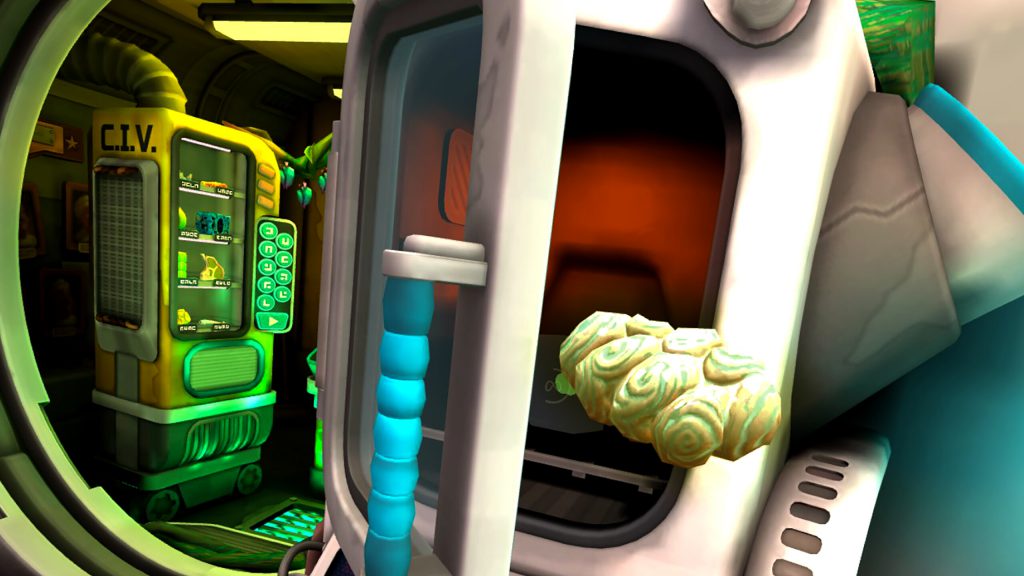
Astro Chef’s ‘station’ set up will be familiar to anybody who has played more than a handful of games on VR. It’s a standard because it works, however vaulting forward to move really breaks immersion. That said, the jumping is smooth — unlike earlier VR titles — and you can also summon a tray/table to your side which can be used for storage. The tray is great and has plenty of room on it for storing various ingredients, and you can assemble completed food onto the plate there before taking it over for dressing and service.
The stations are fun, there’s everything ranging from an oven and blender through to a laser-blade and a pulverising hammer. All of these have different settings, which is where a kind of puzzle element comes into play. If you’re using a certain ingredient then it can only be cut by a blade that is set on one specific mode, it can only be blended at a certain speed, it can only be smashed with a certain intensity. As you memorise that an ingredient is a certain one of the five types it becomes more and more natural to process, however, in order to learn these calibrations and categories you need to scan the items in question. This is a process where you hold a button press on your left hand and point it at something you want to investigate for a couple of seconds. This is, in some ways, very smart, however it’s really frustrating if you haven’t familiarised yourself with the iconography yet as you’ll be swapping between ingredient and tool tips on the regular.
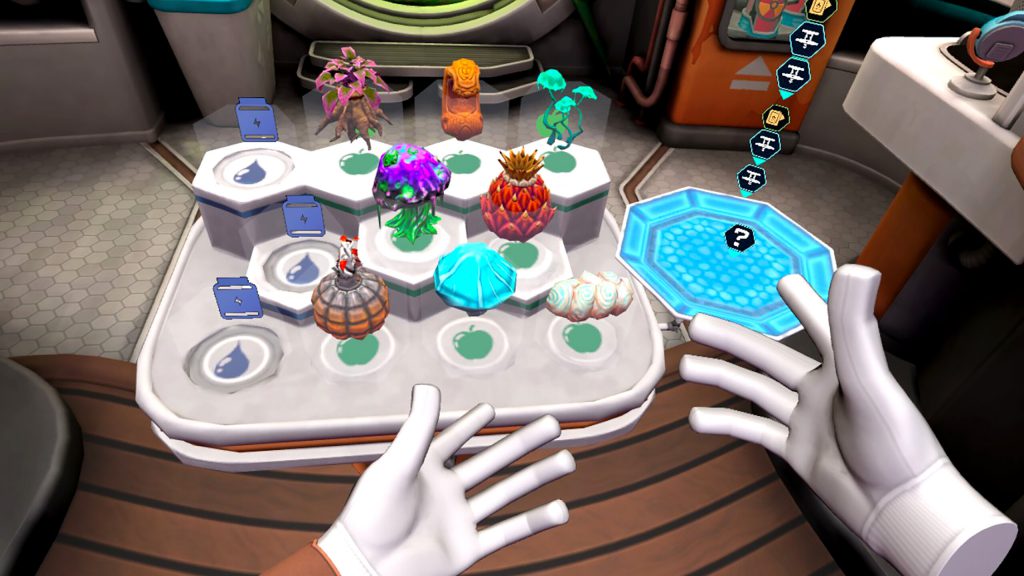
The other frustration comes with how fiddley certain actions are. For the most part there are clearly defined areas of interaction, however Astro Chef currently lacks the ‘assumption of intent’ that other VR games have. For instance, operating the crusher is a five part process: You need to identify which mode your ingredient needs to be crushed with, you need to generate a charge for that mode, you need to place that mode into the upper receptacle, you then need to place your ingredient inside, finally you grab two handles and pull them down to crush the ingredient. The issue is that if the charge isn’t quite in, but looks like it is in, the grips won’t engage — your hands will just pass through it, and squeezing the triggers will do nothing.
Luckily most of the tools have videos running near them that require next steps, especially the machinery style tools, however, the fact that a cell doesn’t click into place when within a short distance of the receptacle feels like a failing here. As with the icons, you do start to watch the screens to check to see if things have engaged, but it’s another obstruction between natural, reflex-based play.
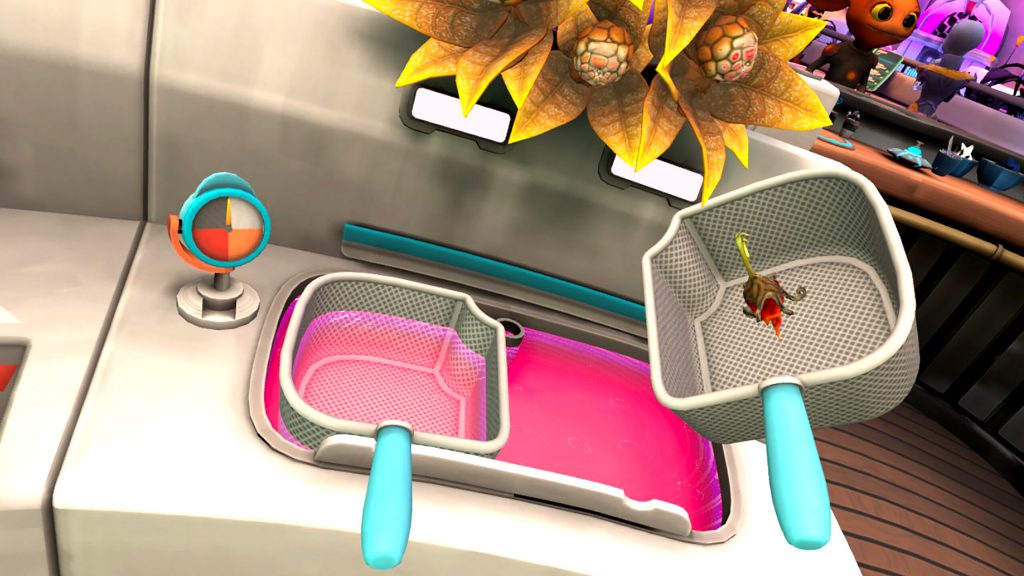
Gameplay, then, is a case of scanning your customer, seeing what foods they like, which cooking styles they like and any other requirements they have, and then making them something they’d love. Astro Chef is all about experimentation, with you actively encouraged to break habits and try to identify the alien species’ feelings on each ingredient and technique. Player confidence and flair come after — there are a choice of fun garnishes and a few goofy things, like darts, littered around your workspace. It does all of this perfectly fine beyond the few issues that I’ve mentioned already.
With all of that out of the way, I want to talk about the real superstar. Astro Chef has a co-operative mode in it that works really well. It works similar to Keep Talking and Nobody Explodes, with one person playing in the VR headset as usual, but with the other reading from an instruction manual. This cuts out the reliance on the info scanner, and leads to some funny situations where you end up developing your own language with the other player in order to convey points quickly and efficiently. That’s fun, that’s really fun… there’s something great there.
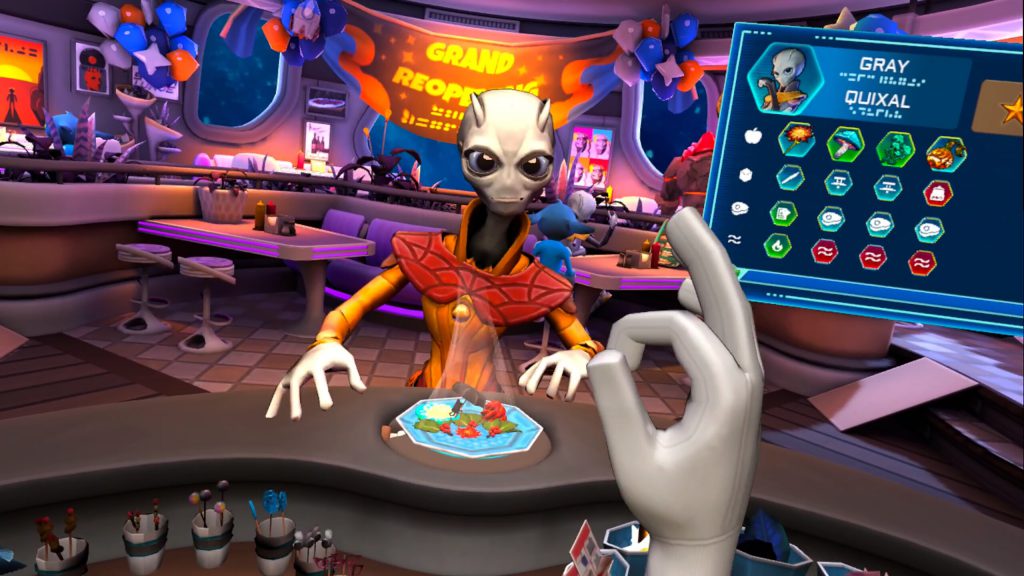
Astro Chef is a really fun simulation title buoyed by its setting and the randomness of the actions you can take. It’s got a solid co-op mode and is only held back by common VR issues.
Astro Chef is available now on the Meta Quest store and through SteamVR.
Comments are closed.